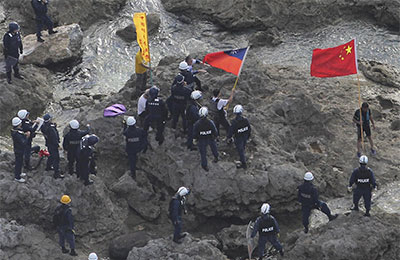It’s a big news day in China, and state-controlled media are purposely dropping the ball to escape controversy and censorship.
Anywhere in the world, the murder conviction of the wife of a senior official would be a big story, but state news agency Xinhua is glossing over patent inconsistencies in the trial, rather than seeking to explain them. And Chinese demand for stories on the spat between China and Japan over the uninhabited Diaoyu islands in the East China Sea reached a peak this weekend as anti-Japanese protests broke out around the country, according to news reports. But domestic news outlets were uncertain how to present the third claimant to the island chain–Taiwan.
Gu Kailai was convicted Monday of murder, and handed a death sentence with a two-year reprieve, which California-based Chinese prisoner rights group Dui Hua reports could be commuted to as few as nine years behind bars. The official narrative explaining her reasons for poisoning British citizen Neil Heywood in Chongqing last year is full of holes. Chinese Internet users and international journalists are asking questions, but the official media is going out of their way to evade them.
For example, does the economic dispute that supposedly soured relations between Gu and Heywood implicate Gu’s husband, Bo Xilai, in illegal dealings that would have implications for the Party’s anti-corruption stance, and the lack of transparency surrounding top leaders’ financial holdings? The details of the trial published by Xinhua avoid even mentioning Bo’s name. Or, if Gu really killed Heywood for threatening her son, Bo Guagua, why did Guagua’s written testimony deny having met or associated with Heywood in recent years, as The Washington Post reports? Even if the legal system has accepted this explanation, why does a convicted murderer stand a significant chance of spending less time in jail than imprisoned journalists like Shi Tao and Liu Xiaobo, who are serving 10 and 11 years respectively?
Gu is at once a victim of a system struggling to gloss over her husband’s likely involvement in her crimes, and a privileged defendant, handed a soft sentence due to her high profile which others–like Memetjan Abdulla, a Uighur website manager imprisoned for life on undisclosed charges after giving interviews to foreign media over riots in Xinjiang–do not enjoy. Chinese journalists could follow the example of Hu Shuli, the Caixin editor who penned an op-ed criticizing the trial’s narrow focus: “[Gu’s] brazen sense of immunity from the law was supported by a network of high-level officials in the Chongqing Ministry of Public Security.” But most will swallow Xinhua’s line that “She played the main role…and was the principal criminal.”
Interestingly, the state-run English language Global Times was more direct than less influential publications when it came to the other major news story of the moment, the Diaoyu islands, according to an analysis by the Hong Kong-based China Media Project. The Times published a photo of a Chinese landing on the island on the front page, despite the fact that it included a symbol generally unacknowledged on the mainland–the Taiwanese flag. Other news outlets get less credit; they blocked out the offending image with large headlines, or in at least one case, simply removed it altogether with photoshop, the Media Project reported.
Failing to question a murky legal trial and photoshopping a news image are serious journalistic sins, and do everyone a disservice. There are smart people working for Chinese publications, but the risk of their reporting being blocked, or the risk of being punished, is holding them back. Once again, media control is the Chinese media’s worst enemy.
